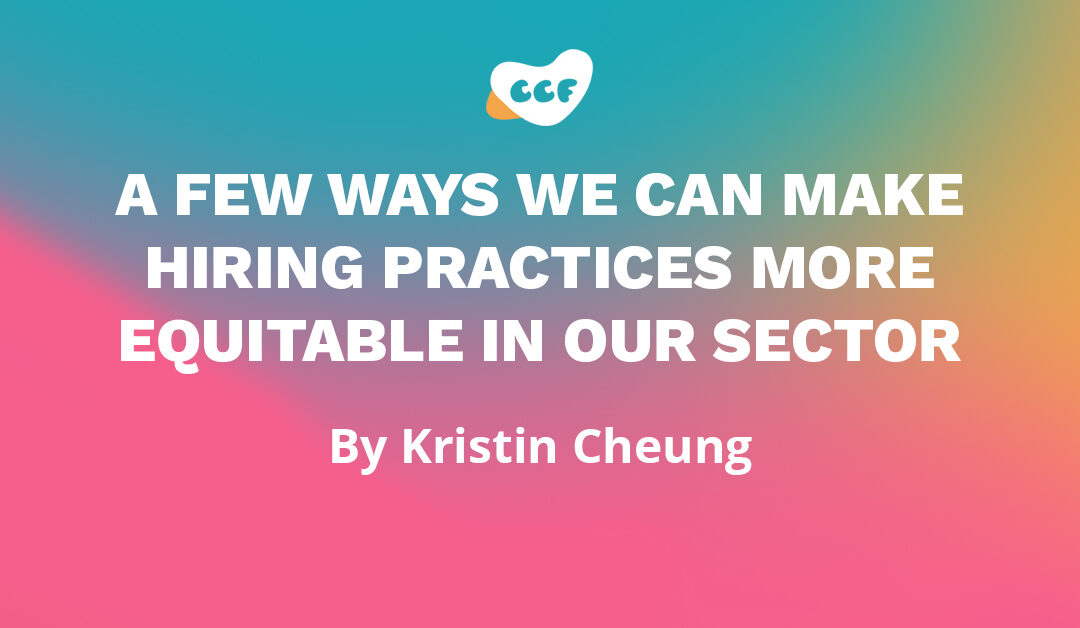By Kristin Cheung, Executive Director
I’m currently in an Executive Director leadership role for a nonprofit based in Vancouver, Canada. And I often receive emails and contacts from recruiters looking to hire. A few months ago, I was interviewed for a position with another nonprofit organization in a different city. Because it was another city with unfamiliar folks, I expected the hiring process to be different from what I’m used to, with small changes here and there. But as the interview process went on, from the initial phone call to the group interview, there were many moments that made the entire process uncomfortable for me.
I’ve probably completed dozens of interviews in the past 15 years of my work experience – both as the interviewer (hiring candidates) and the interviewee (applying for a role). And as I reflected on this specific and uncomfortable experience, it made me question — what are the best practices for “equitable hiring” that make the experience positive for both candidate and interviewer?
I am constantly learning through my experiences and knowledge shared with my peers. I’m conscious about building an organization with justice, equity, diversity, and inclusion embedded in all aspects of the organization. Hiring practices are one of the most important aspects, and these are a few ways to make hiring practices equitable in our sector:
Paying Candidates for Interviews
Paying people fairly and at a living wage is one key aspect of supporting all folks involved in the hiring process. This also includes Hiring Committee members, specifically if your organization invites members of the community that you serve to join a hiring committee.
When any candidate enters the interview process, they have already completed hours of work, including researching the job role and organization, filling out the application, developing a well-crafted resume and cover letter, and preparing themselves professionally, emotionally, and mentally for the actual interview.
To make the hiring process more equitable, organizations should look into paying candidates for their interview time.
In Toronto, FoodShare Toronto (a food justice nonprofit organization) started paying candidates $75 per hour-long interview in 2022.
Paul Taylor from FoodShare Toronto said in an interview with City News: “From an equity perspective, folks who have already been made vulnerable by systems and public policies, this is going to help advantage those folks a little better, at least eliminate and challenge some of the disadvantages by recognizing there are costs.”
Paying people fairly and at a living wage is one key aspect of supporting all folks involved in the hiring process. This also includes Hiring Committee members, specifically if your organization invites members of the community that you serve to join a hiring committee. Paying the committee members to join meetings, review applications, and make key decisions in the hiring process is an equitable practice.
Organizations can start by paying candidates for interviews at the local living wage. Living wages should also be the foundation of your organization’s pay scale. A living wage is defined as what is needed to afford a minimum standard of living for a worker and their family and should be enough to cover all basic needs. By starting the wages at a living wage, your organization reduces income inequality by providing everyone a base liveable wage regardless of race or gender. What is considered a living wage varies based on where you live., You can use Living Wage Calculators to determine the different rates in the USA and in Canada.
Providing job interview questions ahead of time
Candidates with language barriers, neurodiverse candidates, people with disabilities, and other folks facing invisible barriers will be able to plan ahead and help them with the process.
The traditional model of interviews is to present your list of interview questions to the candidate on the spot without any preparation to see how the candidate can quickly respond to the intimidating interview questions off the top of their head.
What this does is reward the candidates with more “interview training,” more experience, and more English language skills to go on to the next interview phase. Providing the candidates with interview questions beforehand will make the process more equitable. All candidates have the same opportunity to prepare and can be evaluated on the same criteria; this promotes equity in the interview process and reduces the potential for bias or discrimination
Candidates with language barriers, neurodiverse candidates, people with disabilities, and other folks facing invisible barriers will be able to plan ahead and help them with the process. And it will make them feel more comfortable with the interview stage. It will also level the playing field and ensure all candidates have the opportunity to perform the best of their abilities.
Randstad (an HR service company) states “People with disabilities consistently face systemic barriers and discrimination when accessing employment.” Providing information such as the interview questions in advance will make the interview process more accessible and inclusive for everyone.
Disclosing the pay for the role
Pay transparency policies are one of the most effective ways to close the gender pay gap and make it more equitable in hiring across the board. In the US, only 34% (or 17 states) have laws around pay transparency, and in Canada, only 30% (or 4 out of 13 provinces/territories) have laws around pay transparency or pay equity legislation. In the province of British Columbia (where I work), women earned 17% less than men; average hourly wages for men were $35.50 CAD while women earned an average of $29.53 per hour (with the gap increasing for Indigenous, racialized, and newcomer women). In the US, it’s similar; women earned an average of 82% of what men earned. Employers should be required to include wage or salary ranges on all advertised jobs. Doing this will contribute to closing the gender pay gap across the board.
Overall, all organizations have different values and mission statements. We spend a lot of time, energy, and resources to meet the needs of our community and take care of the patrons in our circle, whether they be donors, stakeholders, or other members of the community we are working with. But we should also be taking care of the folks inside the organization as well. We need to take care of our employees and treat them well — starting before they interview with us and throughout their journey with our organization. By compensating people involved in the hiring process fairly for their time, providing questions beforehand for accessibility, and providing pay transparency, we can make hiring practices more equitable for the sector.

Kristin Cheung
Kristin Cheung | 冮雪莉 (she/her) is an arts administrator and fundraiser. She is originally from Treaty 6 territory (Edmonton) and now currently residing in the Unceded territories of the xʷməθkʷəy̓əm (Musqueam), Skwxwú7mesh (Squamish), and səl̓ílwətaʔɬ (Tsleil-Waututh) Nations (also known as Vancouver), Turtle Island. Passionate about working with and supporting the work of underrepresented communities, she has volunteered and fundraised for numerous culturally diverse nonprofits in Vancouver and Edmonton. In 2016, she co-founded The Future is you and me, a free community mentorship program for young women of colour and Indigenous women in the arts. This intersectional feminist program aims to build a future with strong, diverse women in leadership positions, reflective of the current cultural landscape. Kristin has a Masters in Arts Administration & Cultural Policy from Goldsmiths University of London and spends her free time as a board member of Centre A and Room magazine.
Discover more from CCF
Subscribe to get the latest posts sent to your email.


YES!!!!! WOW!!!!! I have never heard of this concept but I totally left a 2 hour interview feeling like the company owed me money for the amount of consulting I offered the Board and staff. I wound up being hired by the company but it was so dysfunctional that I do feel compensated for the emotional labor I endured on top of the actual work. Nonetheless, I consider whether I would have felt sufficiently made whole had I not been hired, as I spent at least 10 hours of preparing (including two very long interviews). Thank you for elevating this idea of paying candidates.